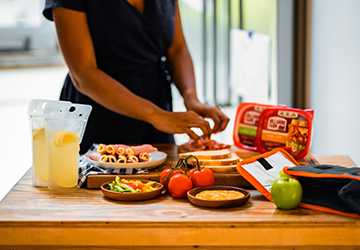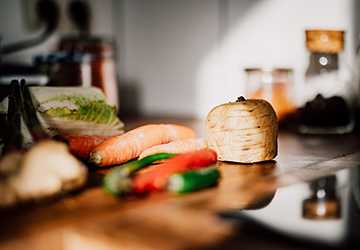In an era where sustainability is more crucial than ever, zero-waste cooking emerges as a critical player in the future of food sustainability. This practice revolves around using food to its fullest potential, minimizing waste, and maximizing efficiency. It's about rethinking how we prepare, consume, and dispose of food. Implementing zero-waste cooking tips reduces our environmental footprint and promotes a more ethical and responsible approach to food consumption.
The Pillars of Zero-Waste Cooking
The core of zero-waste cooking lies in a few fundamental principles: using whole ingredients, repurposing leftovers, and composting. Adopting sustainable cooking practices like buying in bulk, choosing local and seasonal produce, and utilizing every part of an ingredient are essential zero-waste cooking tips. For instance, vegetable peels can be turned into flavorful stocks, and overripe fruits can be baked into desserts, embodying efficient food waste reduction techniques.

Impact of Zero-Waste Cooking on the Environment
The environmental impact of zero-waste cooking is profound. By reducing food waste, we significantly reduce greenhouse gas emissions associated with food decomposition in landfills. Additionally, sustainable cooking practices encourage less reliance on processed foods, which often come with extensive packaging and a high carbon footprint. These efforts are crucial in our collective stride toward a sustainable future.
Innovative Zero-Waste Cooking Techniques and Recipes
Innovation is at the heart of zero-waste cooking. The possibilities are endless, from food waste reduction techniques that transform scraps into gourmet dishes to creative ways of preserving and fermenting. This approach encourages cooks to experiment and explore, turning what would be waste into culinary wonders. Sharing and learning new zero-waste cooking tips has become part of a more significant community movement towards sustainable cooking practices.
Educational Role and Community Involvement in Zero-Waste Cooking
Education plays a pivotal role in promoting zero-waste cooking. Cooking classes, online tutorials, and cookbooks dedicated to sustainable cooking practices are becoming more prevalent. Community initiatives like shared gardens and composting programs further support the ethos of zero-waste cooking tips. These communal efforts amplify the message of sustainability, making food waste reduction techniques more accessible and actionable.
The Future Outlook: Mainstreaming Zero-Waste Cooking
Looking ahead, zero-waste cooking is set to become more than a niche trend. As awareness about environmental issues and food sustainability grows, these practices will likely become mainstream. Adopting food waste reduction techniques in home kitchens and commercial settings is a testament to a growing consciousness around food and its impact on the planet. The future of food sustainability hinges on our ability to embrace and innovate within the realm of zero-waste cooking tips and sustainable cooking practices.
Zero-Waste Cooking: A Multi-Faceted Approach to Food
Zero-waste cooking is more than a method; it's a philosophy that intertwines with various aspects of food production, preparation, and consumption. This approach involves a holistic understanding of food's journey from farm to table. We can substantially minimise our environmental impact by incorporating zero-waste cooking tips into every step, from selecting ingredients to preparation and disposal. It's not just about reducing waste but also about appreciating the value of food and the effort that goes into producing it.

The Role of Mindful Shopping and Meal Planning
One of the foundational steps in adopting sustainable cooking practices is mindful shopping and meal planning. This involves buying only what is necessary, focusing on local and seasonal produce, and understanding how to efficiently store and preserve different food items. Planning meals can significantly reduce impulsive purchases that often lead to excess food being wasted. These practices are essential for implementing daily food waste reduction techniques.
Innovative Cooking Techniques for Zero-Waste Kitchens
Innovative cooking techniques play a crucial role in zero-waste kitchens. Techniques such as fermentation, pickling, and using traditionally discarded parts of food (like beet greens or carrot tops) can transform how we perceive food waste. These zero-waste cooking tips add unique flavours and textures to our meals and ensure that every bit.
Conclusion
Zero-waste cooking is not just a concept but a necessary shift in our approach to food. It represents a holistic, responsible, and sustainable way of living. Integrating zero-waste cooking tips and sustainable cooking practices into our daily lives becomes imperative as we face global environmental challenges. This movement stands at the forefront of environmental stewardship, influencing how we think, cook, and eat for the betterment of our planet and future generations.
Faqs:
FAQ 1: How Can I Start Practicing Zero-Waste Cooking at Home?
Answer: Starting zero-waste cooking at home is easier than you might think. Begin with small steps like planning meals to avoid overbuying, using every part of your ingredients (like vegetable peels for stocks), and storing food properly to extend its shelf life. Implementing zero-waste cooking tips such as repurposing leftovers into new meals and composting organic waste are great ways to reduce your food footprint. Remember, zero-waste cooking is as much about mindset as it is about technique.
FAQ 2: What Are Some Key Sustainable Cooking Practices for Reducing Food Waste?
Answer: Key sustainable cooking practices for reducing food waste include buying bulk to minimise packaging, choosing local and seasonal produce, and learning preservation techniques like canning and fermenting. Additionally, using food waste reduction techniques such as freezing overripe fruits for smoothies or making vegetable broth from scraps can significantly reduce kitchen waste. These practices reduce waste and add creativity and flavour to your cooking.
FAQ 3: Are Zero-Waste Cooking and Plant-Based Diets Interconnected?
Answer: Yes, zero-waste cooking and plant-based diets often intersect. Plant-based diets emphasize the consumption of whole foods, which aligns well with zero-waste cooking tips such as using whole vegetables and fruits, including skins and stems. Plant-based diets tend to produce less packaging waste and have a lower environmental impact, complementing the principles of sustainable cooking practices. By adopting a more plant-focused diet, you'll likely adopt many zero-waste habits naturally.